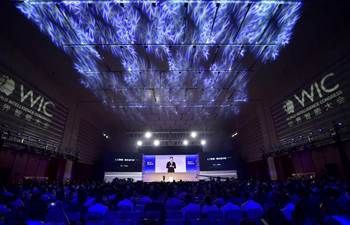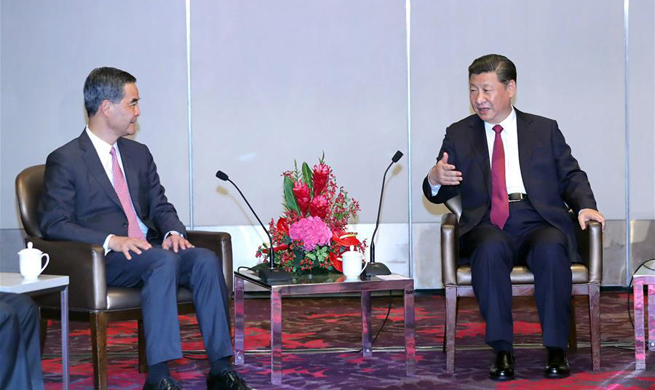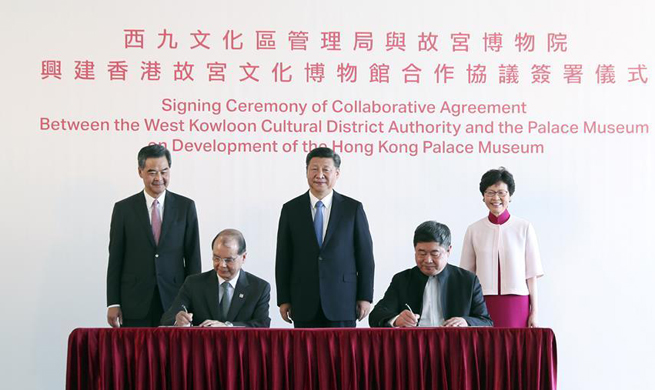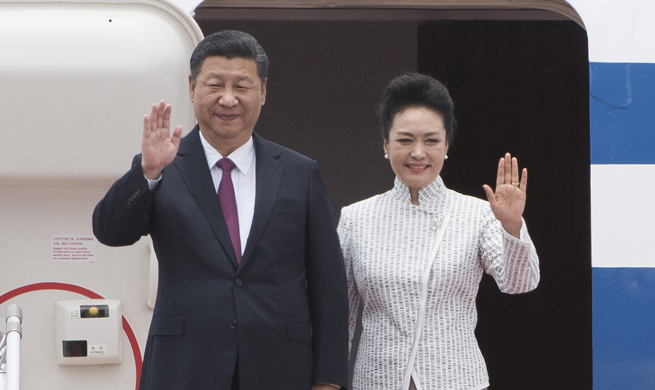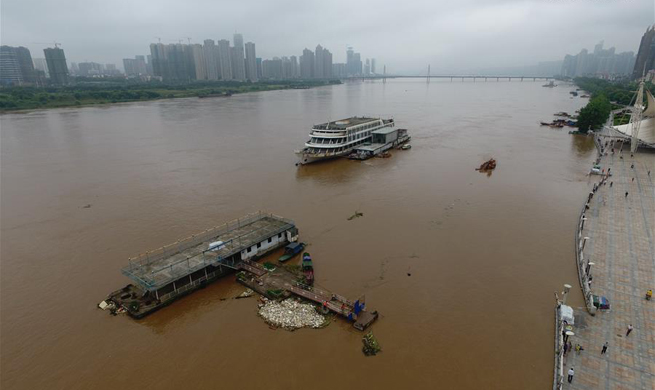DALIAN, June 29 (Xinhua) -- On June 27, 2017, following his address at the Opening Ceremony of the Annual Meeting of the New Champions 2017, Premier of the State Council Li Keqiang answered questions from Executive Chairman of the World Economic Forum Klaus Schwab at Dalian International Conference Center. On June 28, Premier Li sat down for a dialogue with representatives of international business leaders attending the Annual Meeting. Below is the full text of these interactions:
Professor Schwab: In your speech, you talked about the dynamic development of the Chinese economy as well as relevant policies. I'm sure these policies can help sustain such dynamism. It is a remarkable achievement for China, the second biggest economy in the world, to grow at nearly 7%. Could you please share with us in greater detail what measures the government will take to keep such positive momentum going in the future?
Premier Li: China used to grow at double-digit rates, but now the growth has moderated to a medium-high level of 6.9% in the first quarter of this year. Some characterize this trend as a slowdown, but that wouldn't be very accurate, as the Chinese economy has become much bigger than before. Every one percentage point of growth in GDP now would generate the same amount of additional output as 1.5 percentage point growth five years ago or 2 percent growth ten years ago. I often use the analogy of somersaults to describe such a situation: It is much easier for a child to do a dozen somersaults at one go than for an adult, for whom just three or four would be quite an accomplishment. For major economies with GDPs of two trillion US dollars or above, a 3% growth would be no mean feat. I hope you can view the Chinese economy in an objective way. It will keep growing at medium-high speed, as we have 1.3 billion people, huge market potential and social creativity.
To sustain the positive momentum requires a host of measures. We will keep on working in the following three areas for a considerable time to come.
First, we will maintain stability in macroeconomic policies. This means we will continue to implement a proactive fiscal policy and prudent monetary policy. We will not resort to massive stimulus measures. Instead, we will continue to undertake structural adjustments and provide the market with stable and clear expectations, which is of overriding importance in a market economy.
Second, we will advance reform and opening-up. In undertaking supply-side structural reforms, the government will continue to streamline administration, delegate its power, widen market access and enhance compliance oversight to create a level playing field. We will ease corporate burdens by reducing taxes and administrative fees to unleash the vitality of the market.
Third, we will accelerate efforts to replace traditional drivers of growth with new ones. We will adopt market- and rules-based approach to tackle and phase out excess and backward capacity in steel, coal and other sectors. Meanwhile, we will work hard to grow new drivers and encourage the development of new technologies, new business forms and models. In this process, the government will exercise accommodating and prudent supervision to provide an enabling environment for the healthy growth of the new economy. Furthermore, Chinese and foreign-invested companies will be treated as equals.
Professor Schwab: Looking around the world, the Chinese government has been most effective in embracing the Fourth Industrial Revolution. I want to congratulate you and the Chinese government on that. That said, the Fourth Industrial Revolution also has its disruptive effect, including on employment and income distribution. You did talk about this in your opening speech. What steps is the Chinese government taking to reduce such adverse impact?
Premier Li: Thank you, Professor Schwab, for your positive comments on the steps taken by the Chinese government in the Fourth Industrial Revolution or the new industrial revolution, but I would hesitate to say that we are most effective in this aspect. As a Chinese proverb goes, "when the moon reaches its fullest, it begins to wane". We are in constant pursuit of perfection out of a recognition of our own imperfections. I believe the new round of industrial revolution brings more opportunities than challenges, but it is not always the case in all fields and sectors. After all, everything has its pros and cons.
Take employment for example, will the extensive application of artificial intelligence and robots deprive people of their jobs? This is indeed a question, and it is already happening in some industries and sectors. Yet, through the Internet Plus initiative and mass entrepreneurship and innovation, new technologies and new business forms empowered by the new round of industrial revolution, such as online shopping, express delivery and bike-sharing, have generated far more jobs than those taken by robots. In this sense, what we are experiencing is only a structural shift, which calls for adjusting the training in labor skills. We will meet such challenge head on, because it is simply inescapable. More importantly, the development of new technologies, business forms and models makes it possible to accommodate and harness people's individual choices to generate greater market potential and put everyone's talent to best use. By pooling the wisdom of all people, we will be able to create far more wealth and jobs than what have been lost.
This is a race against time. Professor Schwab just said that in the future, it's not going to be the big fish eating the small fish, but the fast fish eating the slow fish. I want to add to that metaphor. The fast fish will certainly do better than the slow fish, but I do hope that the slow fish will move faster and catch up with the fast fish, and the fast fish will also turn around to help the slow fish.
Feike Sijbesma, Chairman and CEO of the Royal DSM Group: Premier Li, over the last several years, key tasks have been performed on the supply-side reform. My question is: Could you elaborate a little bit on the progress in these areas and the contribution the international business community can bring to reform in the next stage?
Premier Li: China has focused on supply-side structural reform in comprehensively deepening reform in recent years. One of its key tasks is to phase out and cut overcapacity in coal and steel production. Last year alone, more than 65 million tons of steel-making capacity and over 290 million tons of coal-production capacity were eliminated. At the same time, we are nurturing new drivers of growth and reducing the burden on companies by widening market access and cutting taxes and administrative fees. A multitude of new market entities has since sprung up in China. Over the past four years, the number of Chinese enterprises has doubled, reaching 27 million, and the number of market entities in total has surpassed 90 million. They have spawned a surge in new technologies and new business forms. China's reform, especially supply-side structural reform, has boosted the structural transformation and upgrading of the Chinese economy.
We all know that excess capacity exists in some sectors globally. This is the result of the quantitative easing policies taken by some countries in response to the financial crisis. Nothing short of a global solution is required. In the face of this issue, China has not shied away from its responsibilities. Instead, we have made painstaking efforts to phase out excess capacity through supply-side structural reform, which is also our contribution to the international community.
Over the past three decades, reform in China has always moved forward side by side with opening-up in a mutually reinforcing way. To advance reform, we need the participation of foreign capital, businesses and expertise. Foreign companies are welcome to take part in the merger and reorganization of enterprises in China. While fostering new growth drivers, we will lower market access thresholds in service sectors for foreign investors and introduce a negative-list management model. The policy support enjoyed by Chinese companies in keeping with WTO rules will be equally applied to foreign enterprises registered in China. We welcome continued investment from your company in China.
Alex Molinaroli, Chairman and CEO of Johnson Controls: The Made-in-China 2025 strategy has greatly promoted China's manufacturing and innovation capabilities. You have already addressed one of my questions about foreign investment and a level playing field for foreign companies within China when answering the last question. Then what challenges and obstacles are there in the implementation of this strategy and what does the Chinese government plan to do in response? (more)







